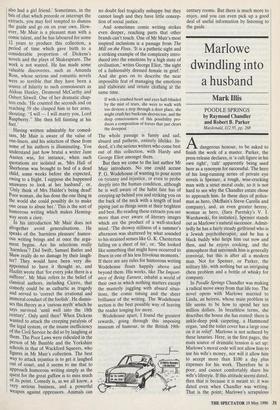Marlowe dwindling into a husband
Mark Illis
POODLE SPRINGS by Raymond Chandler and Robert B. Parker
Macdonald, f12.95, pp. 268
Adangerous honour, to be asked to finish the work of a master. Parker, the press release declares, is 'a cult figure in his own right', 'cult' apparently being used here as a synonym for successful. The hero of his long-running series of private eye novels is Spenser, a tough, wise-cracking man with a strict moral code, so it is not hard to see why the Chandler estate chose to approach him. In these days of police- man as hero, (McBain's Steve Carella and company), and, an even greater heresy, woman as hero, (Sara Paretsky's V. I. Warshawski, for instance), Spenser stands out as Marlowe's natural successor. Admit- tedly he has a fairly steady girlfriend who is a Jewish psychotherapist, and he has a black buddy who helps him out now and then, and he enjoys cooking, and the atmosphere that surrounds him is generally convivial, but this is after all a modern man. Not for Spenser, or Parker, the solitary life, with nothing but an intriguing chess problem and a bottle of whisky for company.
In Poodle Springs Chandler was making a radical move away from that life too. The novel opens with Marlowe married to Linda, an heiress, whose main problem in life seems to be how to spend her ten million dollars. In breathless terms, she describes the house she has rented: there is ankle-deep pink carpeting, a Hammond organ, 'and the toilet cover has a large rose on it in relief . Marlowe is not seduced by these luxuries. Here, in the first pages, the main source of dramatic tension is set up: Marlowe's moral code will not allow him to use his wife's money, nor will it allow him to accept more than $100 a day plus expenses for his work. Therefore he is poor, and cannot comfortably share his wife's lifestyle. If this attitude seems dated, then that is because it is meant to: it was dated even when Chandler was writing. That is the point; Marlowe's scrupulous behaviour does not belong in this century. It would take Spenser's psychotherapist girlfriend to uncover the insecurity and the patronising attitude towards women that may lie beneath his honourable surface, but she has no place in this novel. The tension in the relationship is the main story here, and it is such that it is clear from these first pages that the marriage cannot last.
The other story is equally predictable. Les Valentine, a lovable, drunken loser, owes someone a lot of money. Marlowe finds him, decides that he likes him and, when bodies start appearing, decides in the face of the evidence, that Valentine isn't guilty. It is so clear who is guilty, from about halfway through, that one can only assume that marriage has blunted his pow- ers of detection.
The third point of interest for the reader is nothing to do with the story of the marriage to Linda or the story of Les Valentine. It is the question of tone. The usual characters are there: along with Les Valentine there is a sick, pampered rich girl and her influential father, but does Parker manage to sustain the Chandleres- que style? Does the seam show? The question is complicated by the fact that Chandler himself does not sustain the Chandleresque style. The earlier chapters, those which must be his, are not particular- ly interesting. There is a routine quality to them, with characters sketched in, and without any strong sense of mood or place, without any of his intensely evocative language. This is Chandler going through the motions, perhaps intending to revise, or perhaps unhappy with the concept of a married Marlowe. Still, it is difficult not to speculate. My guess is that Parker comes in quite early, around Chapter Eight. The blurb says that this is a classic novel of suspense. It is not. It is a routine thriller, and therefore not in the true spirit of Chandler, or even, on a good day, of Parker.



































































 Previous page
Previous page